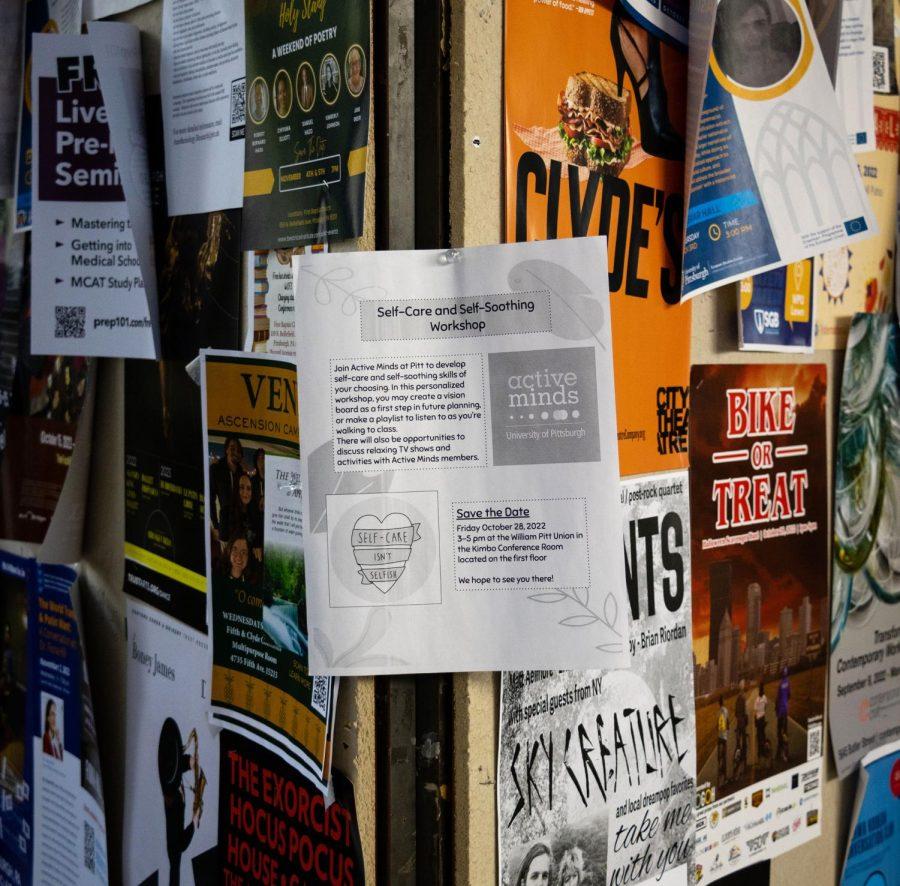Pitt community discusses ways to support mental health on campus
Ethan Shulman | Staff Photographer
A news bulletin with a flyer for a “self-care and self-soothing workshop.”
October 16, 2022
Although Claire Stemmer has never skipped a class for a self-care day, she’s desperately wanted to.
“I’m just at a low point in the semester,” Stemmer, a sophomore theatre arts and linguistics major, said. “This semester has been pretty tiring. I’ve certainly been worse, but I could certainly be better.”
During Mental Health Awareness month at Pitt, students and professors are reflecting on University policies and initiatives that they think could improve mental health on campus. Stemmer said mental health problems can impede a student’s performance just as much as physical health, adding that she doesn’t think Pitt has a “good grasp on the state of its students.”
“Poor mental health can be equally as detrimental as poor physical health, and the stress of thinking about missed classes and missed work can make whatever problems a student may be having even worse,” Stemmer said. “It would be much more beneficial to the student community [if Pitt would] build a safe environment for them with easily accessible and plainly stated mental health resources at the forefront of their response.”
During the 2020-21 school year, Pitt gave students three self-care days throughout the year to replace spring break. While Stemmer said simply giving students mental health days would not be sufficient, they would help.
“I do not feel that one to two days is sufficient, especially considering the nature of mental health problems to spiral worse before they get better. That is not often something that can be helped by one single day,” Stemmer said. “[It] would be easy to implement more mental health days and understanding for mental health problems.”
However, one professor doesn’t think adding mental health days would solve all the mental health issues that students face. Melinda Ciccocioppo, an associate psychology professor, said many mental health problems are perpetuated by internal pressures to receive good grades and the financial burden of college. Ciccocioppo added that having these scattered breaks would make it difficult for scheduling and classwork.
“If someone is struggling from real mental health issues, a day off is not is not going to fix that, “ Ciccocioppo said. “So I think there needs to be then other solutions, besides just providing days off. I think one thing is just making sure that there are resources for students. Maybe letting students know about the fact that everyone struggles, right, that they’re not alone. That college is hard. It’s hard for everyone.”
“Removing some of those financial burdens would be wonderful,” Ciccocioppo added. “Also just kind of cultivating a culture amongst the students in general to just accept an A minus.”
Ciccocioppo said she receives emails every semester from students regarding their mental health, and she’s observed a few students who seem tired, stressed and depressed, but it is difficult to tell in her 400-person classes. Currently, she teaches Introduction to Psychology, Psychology of Gender and Psychology of Women+, with more than 835 students total.
“What’s most common when students are struggling with mental health issues is that they just stopped coming to class,” Ciccocioppo said. “For my small class, I can notice that and I can kind of flag it and sort of reach out and say, ‘Hey, is everything okay?’ That’s really difficult to do with my big classes.”
Ahmed Ghuman, the executive director of the Counseling Center, said the UCC offers many programs that strive to not only make students feel better, but also to redirect the culture on campus regarding mental health. Some services include individual, group and relationship therapy, “Flourish at Pitt: Supporting Students’ Emotional Well-Being” sessions and more.
Ghuman said the University shares information about these resources by going to first-year classes as well as posting ads online and in Pitt buildings. He said he wants all students to have access to mental health services and an understanding environment between students and staff regarding mental health.
“I think students being able to manage their self care and using the resources that are available to them […] is really important, but I think it’s really about, reshaping the culture at Pitt to promote student wellness student well being,” Ghuman said.
However, Stemmer said she was unaware of some of these services. She said she’d like Pitt to better advertise its services and ensure that professors are aware of the importance of mental health in the classroom.
“I am aware of the Counseling Center […] but that is more because of my own research and the general knowledge,” Stemmer said. “I don’t know the finer points of what the Counseling Center offers, which I think is indicative of it not being spoken about enough by the University in-depth.”
Ciccocioppo said while the Counseling Center offers students many resources and is constantly growing, it isn’t the perfect solution. At a large school, she said it’s hard to have enough staff to treat all students.
“I know the University Counseling Center has been working hard to try to make sure that they can accommodate students and that they can meet with students quickly. And my impression from students is that that has been improving,” she said. “But I also think, you know, there’s no way that the University Counseling Center is going to be able to meet all of the mental health demands. How many Pitt students are there? Probably around 20,000.”








